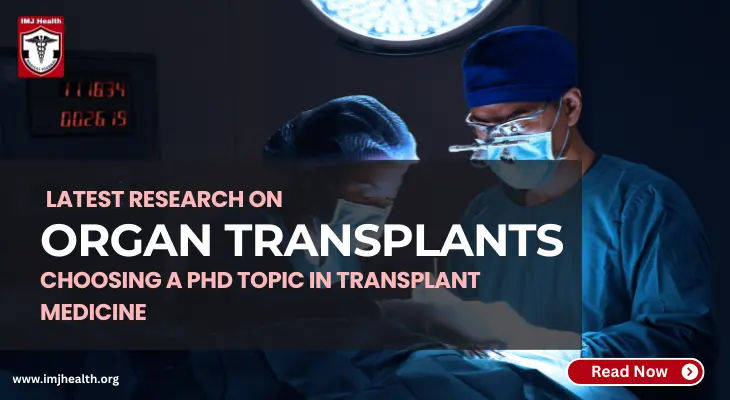Latest Research on Organ Transplants: Choosing a PhD Topic in Transplant Medicine

Explore the latest breakthroughs in organ transplant research, from immune tolerance and bioartificial organs to ethics and policy. This blog guides aspiring PhD candidates in selecting high-impact, interdisciplinary topics that shape the future of transplant medicine, offering insights into career paths, research trends, and the global scope of transplant science.
Organ transplantation remains one of the most transformative achievements in modern medicine, offering renewed life to patients with end-stage organ failure. As surgical techniques advance and immunosuppressive therapies improve, the field is rapidly evolving — making it a dynamic and impactful area for PhD-level research.
This blog highlights the latest developments in transplant research and outlines promising PhD topics for scholars aiming to contribute meaningfully to this life-saving domain.
The Current Landscape of Organ Transplantation Research
Organ transplantation has expanded beyond kidneys and livers to include hearts, lungs, intestines, and even face and limb transplants. However, challenges persist — including donor shortages, immune rejection, long-term graft survival, and post-transplant complications.
Key areas of active research include:
- Improving graft survival rates
- Reducing dependence on immunosuppressants
- Enhancing organ preservation during transport
- Expanding donor criteria (e.g., from marginal or xenogeneic donors)
- Exploring regenerative medicine and bioartificial organs
These advancements offer fertile ground for deep academic exploration at the PhD level.
Choosing a PhD Topic in Organ Transplantation: Emerging Research Areas
PhD scholars interested in transplant medicine can contribute to innovation, clinical outcomes, and public health through original research in these trending areas:
1. Immunotolerance and Immune Modulation
Why it matters: Lifelong immunosuppression increases the risk of infections and cancer. Research into inducing immune tolerance could reduce or eliminate this need.
Potential PhD topics:
- Mechanisms of immune tolerance in organ transplants
- Role of T-regulatory cells in graft acceptance
- Development of biomarker-based tools to monitor immune responses
2. Organ Preservation and Perfusion Technology
Why it matters: Many organs are lost due to poor preservation techniques.
Potential PhD topics:
- Normothermic machine perfusion vs. cold storage
- Use of oxygenated perfusates in liver and heart transplantation
- Real-time viability assessment during organ transport
3. Xenotransplantation and Bioartificial Organs
Why it matters: Animal-to-human transplants and lab-grown organs could solve the organ shortage crisis.
Potential PhD topics:
- Genetic modification in pigs to prevent cross-species rejection
- Bioprinting functional human tissues for transplantation
- Immunological barriers in xenotransplantation
4. Post-Transplant Infections and Complications
Why it matters: Transplant recipients are at high risk of life-threatening infections and organ dysfunction.
Potential PhD topics:
- Role of gut microbiota in post-transplant immunity
- Antifungal prophylaxis in solid organ transplant patients
- Drug-induced nephrotoxicity and protective interventions
5. Ethics and Public Policy in Organ Donation
Why it matters: Public trust, consent systems, and allocation fairness are central to transplantation programs.
Potential PhD topics:
- Opt-out vs. opt-in donation models: Comparative analysis
- Addressing disparities in transplant access and outcomes
- Legal and ethical concerns in living donor transplants
6. Pediatric and Geriatric Transplant Outcomes
Why it matters: Age-specific immune responses and complications require tailored strategies.
Potential PhD topics:
- Long-term outcomes in pediatric liver transplantation
- Geriatric recipient eligibility and survival predictors
- Quality-of-life assessments post-transplant across age groups
Interdisciplinary Research Opportunities
Transplant medicine overlaps with several other disciplines. Aspiring PhD candidates may also consider research in:
- Pharmacogenomics (individual response to immunosuppressants)
- AI and predictive analytics in transplant success forecasting
- Telemedicine and remote care for post-transplant monitoring
- Behavioral science to improve donor registration and medication adherence
Why Choose a PhD in Transplant Research?
- High global impact: Addressing real-world health crises like organ shortages
- Funding opportunities: Supported by national health bodies and international grants
- Clinical innovation: Close collaboration with surgeons, immunologists, and bioengineers
- Career potential: Academia, biotech, regulatory bodies, and hospital research centers
Organ transplantation is more than a clinical procedure — it’s a multidisciplinary research frontier that saves lives and reshapes the future of medicine. A PhD in this field allows researchers to contribute directly to improving patient survival, organ availability, and healthcare equity.
At IMJ Health, we invite original research, case studies, and reviews on all aspects of organ transplantation. Scholars and researchers looking to publish in this field are encouraged to explore our open-access platform for global visibility and and academic recognition.
FAQs on Organ Transplant Research and PhD Topics
1. Why is organ transplant research important for a PhD?
Organ transplant research addresses critical global challenges such as organ shortages, immune rejection, and long-term graft survival. A PhD in this field enables scholars to contribute to life-saving innovations in surgery, immunology, bioengineering, and public health.
2. What are the most in-demand areas for PhD research in transplant medicine?
Top areas include immunotolerance mechanisms, xenotransplantation, organ preservation technologies, post-transplant infections, regenerative medicine, and ethical policy research in donor systems.
3. Can non-surgeons pursue a PhD in organ transplant research?
Yes. Many research roles focus on immunology, molecular biology, pharmacology, microbiome studies, and health policy—making it accessible to non-surgical candidates with backgrounds in biomedical sciences, pharmacy, or public health.
4. What skills are important for PhD students in this field?
Candidates should be skilled in research methodology, biostatistics, molecular techniques, data analysis, and academic writing. Familiarity with clinical trial design, immunology, or bioinformatics is a plus, depending on the research area.
5. Are there career opportunities outside academia after completing a PhD in organ transplantation?
Absolutely. Graduates can work in biotech firms, pharmaceutical R&D, transplant coordination agencies, hospitals, regulatory bodies, and public health organizations focused on transplantation programs.
6. Is there funding or fellowship support available for transplant research?
Yes. Various governments, international health agencies, and transplant societies (e.g., The Transplantation Society, NIH, WHO) offer grants and fellowships for PhD-level research in this high-priority medical domain.
Contact Medical Journal: IMJ Health
- Website: www.imjhealth.org
- Editor-in-Chief: Dr. Kusum Lata Gaur | MBBS, MD(PSM), CIC (IGNOU), PGCHFWM
(NIHFW) (WHO Fellow IEC)
Professor, PSM & Member of Research Review Board | SMS Medical College, Jaipur (Rajasthan) India - Editor-in-Chief Email ID: info@imjhealth.org
- General Support Email: info.imjh@gmail.com
- Contact us on WhatsApp: Chat Now : +91-7665235235

 October 2025 Articles
October 2025 Articles Submit Article
Publication Fee
Research Areas
Guidelines for Authors
Process of
Publication
Journal Importance
Journal Indexing
Journal Polices
Digital
Identification Number
FAQs
Submit Article
Publication Fee
Research Areas
Guidelines for Authors
Process of
Publication
Journal Importance
Journal Indexing
Journal Polices
Digital
Identification Number
FAQs
| Citation Indices | All | Since 2019 |
| Citation | 280 | 209 |
| h-index | 7 | 7 |
| i10-index | 3 | 1 |
| Acceptance Rate (By Year) | |
| Year | Percentage |
| 2024 | 8.17% |
| 2023 | 10.84% |
| 2022 | 9.14% |
| 2021 | 11.26% |
| 2020 | 11.8% |
| 2019 | 10.3% |
| 2018 | 8.65% |
| 2017 | 12.9% |
| 2016 | 10.9% |
| 2015 | 12.5% |
